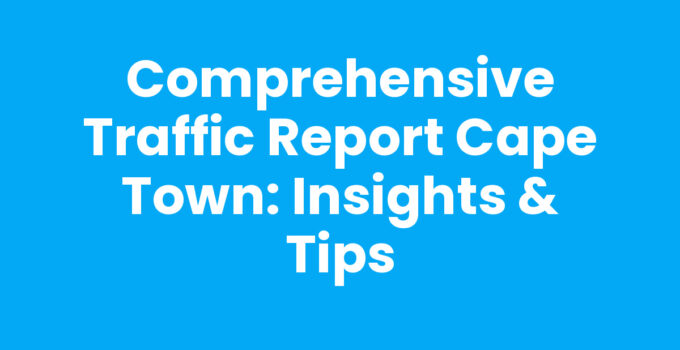As one of the most vibrant cities in South Africa, Cape Town sees a constant flow of traffic, influenced by various factors such as tourism, local commuting, and ongoing infrastructure projects. Understanding traffic patterns is crucial for both residents and visitors to navigate the city efficiently. In this post, we’ll delve into the essentials of the Traffic Report for Cape Town, explore key insights, and provide practical tips for navigating traffic in this bustling metropolis.
Traffic Report Cape Town: A Comprehensive Overview
The Traffic Report for Cape Town serves as a vital resource for understanding traffic dynamics in the city. According to recent data, key factors contributing to traffic congestion include:
- Peak Hours: Traffic typically peaks during the morning (7 AM – 9 AM) and evening (4 PM – 6 PM) rush hours. Commuters should plan their journeys accordingly.
- Tourist Seasons: Cape Town attracts millions of tourists annually, particularly during summer. This influx can significantly increase traffic congestion in popular areas.
- Road Maintenance: Ongoing roadworks and maintenance can lead to unexpected delays, highlighting the necessity of check current traffic reports before traveling.
By regularly consulting traffic reports, residents can make informed decisions about their routes and travel times.
To effectively utilize the Traffic Report for Cape Town:
- Access Real-time Reports: Use apps like Google Maps or Waze to access current traffic conditions. These tools offer real-time updates and alternative routes.
- Identify High-Traffic Areas: Familiarize yourself with known hotspots such as the N1 and N2 highways, and major intersections that are prone to bottlenecks.
- Plan Ahead: If you know you’ll be driving in peak times, consider leaving earlier or later to avoid congestion.
- Take Public Transport: Cape Town has various public transport options which can alleviate the burden of traffic. Using the MyCiTi bus service during peak times is a practical alternative.
Staying informed and planning effectively can greatly enhance your travel experience in Cape Town.
Check This: Experience Luxury at the Cape Town Fountain Hotel
Benefits of Understanding Traffic Reports
Gaining insights into traffic trends in Cape Town provides numerous advantages:
- Improved Time Management: Knowing when traffic is likely to be heavy helps in planning trips more efficiently, reducing travel time.
- Enhanced Safety: By being aware of accident-prone areas or heavy traffic conditions, drivers can make safer choices on the road.
- Reduced Stress: Anticipating traffic can help minimize the frustration often associated with being stuck in congested areas.
See Also: Discover the Best Cape Town Brunch Spots for Every Taste
The Future of Traffic Management in Cape Town
Looking ahead, traffic management in Cape Town aims to embrace technology for better traffic flow:
- Smart Traffic Signals: Implementing adaptive traffic signal systems can optimize vehicle flow, especially in congested areas.
- Data Analytics: By analyzing traffic patterns over time, city planners can make informed decisions to improve infrastructure and public transport.
- Community Engagement: Involving citizens in traffic management discussions can lead to innovative solutions for specific local challenges.
As Cape Town gears up for the future, staying updated on traffic reports will be increasingly essential for the community.
You Might Also Like: Train Johannesburg Cape Town: Your Ultimate Travel Guide
Conclusion
Understanding the Traffic Report for Cape Town is crucial for both locals and tourists wishing to navigate the city successfully. By utilizing real-time updates and recognizing busy travel periods, individuals can make smart travel choices. As traffic management continues to evolve, the importance of these reports remains a staple for efficient city navigation.
Check This: Discover the Best Stadiums In Cape Town for Sports Fans
Frequently Asked Questions
What factors contribute to traffic congestion in Cape Town?
Key factors include peak hours, tourist seasons, and ongoing road maintenance.
How can I access real-time traffic reports for Cape Town?
You can use apps like Google Maps or Waze for real-time traffic conditions and updates.
What public transport options are available in Cape Town?
Cape Town offers various public transport options including the MyCiTi bus service, which is efficient during peak times.



